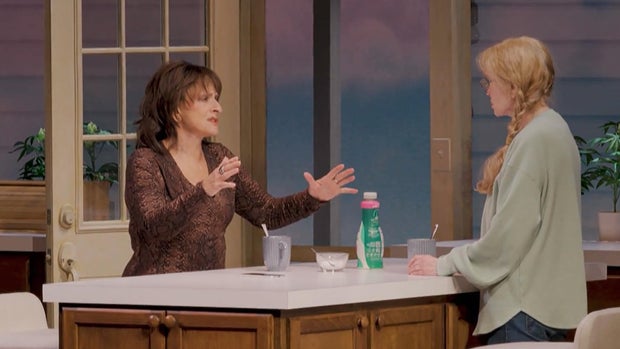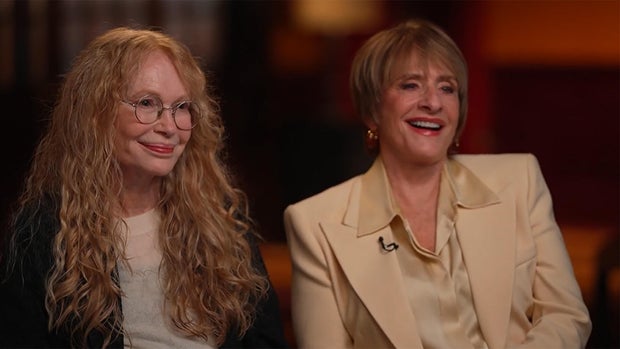Mia Farrow and Patti LuPone: Pals, and now co-stars on Broadway

Mia Farrow and Patti LuPone have been friends for 30 years. “We are different,” said LuPone. “I’m sort of, I guess you’d say I’m pepper, she’s sugar. Or agave or honey, and I’m paprika. Do you know what I mean?”
“I wouldn’t have thought of the food element, probably, or the spice element,” Farrow laughed. “But that’s not wrong! I don’t know. I see, below the pepper or honey or agave, if you will, is a human soul that is immense, and that I am drawn to. I really value Patti as a friend.”
As close as these two showbiz veterans are, they have never worked together, until now, in “The Roommate,” the two-person play opening on Broadway this month.
CBS News
At 75, Patti LuPone made her Broadway debut more than 50 years ago. She’s won three Tony Awards, for roles in “Evita,” “Company” and “Gypsy.”
Mia Farrow, who is 79, got her start even earlier, in the TV show “Peyton Place” in the mid-1960s. She’s the first American woman to join the Royal Shakespeare Company, and she achieved cinematic immortality in the horror classic, “Rosemary’s Baby.” “To this day, [it’s] the best part I’ve ever been offered,” Farrow said.
Getting these two legends together took a little convincing, and coordinating, with the director asking each of them if they would do it.
“We did call each other a lot,” LuPone said. “Because I thought it would be so exciting to work with Mia, whom I adore. Just to listen to Mia talk about anything is such an event that I would rather do that than rehearse. I would rather do that than eat lunch. We all feel that way. It’s an amazing experience just to listen to her.”
Farrow said she decided on doing the play first, but it was dependent upon LuPone doing it as well. “But they went to Mia first,” said LuPone. “And I’m actually a second choice. I don’t even know what I’m talking about, ‘I’m a second.’ I could be a third choice! I don’t know.”
“I’m really glad it’s Patti,” said Farrow.
And who was ahead of Patti? “Annette Bening,” said LuPone.
What is that like as an actor? “Well, I’ll tell you! It’s not comfortable,” said LuPone. “You accept the part because you need to!”
“The Roommate” is a comedy about a New Yorker (portrayed by LuPone) who moves into the Iowa home of Farrow’s character. Secrets and surprises abound. It’s one set, one act, and 90 minutes of lines to remember, between the two of them.
Playwright Jen Silverman (who calls her show’s stars “icons and legends,” as well as “consummate artists”) says “The Roommate” gives audiences the chance to see the richness and depth of “women of a certain age,” who Silverman says are often rendered invisible.
LuPone said, “It is harder for roles for women our age. And it’s a pity because we come with a certain amount of wisdom [and] experience that is still sexy. Still very sexy.”
“Why do you see it as sexy?” asked Doane.
“Because it is!” LuPone laughed. “Because we come with a power.”
CBS News
In the past LuPone has used her stature to admonish audience members who peek at their phones during a performance. “I think we all abhor it; I’m just vocal about it,” she said. “It’s distracting to the actor, but it’s worse for the audience, you see, because we’re trying to create a story, weave a spell.”
Mia Farrow’s own life story has always fascinated the public. At 21 she married Frank Sinatra. “Like Patti, he was Sicilian,” she said. “But unlike Patti, he had a temper. But the essential person was so compassionate, and shy, and readily available, more than anyone I’ve ever known. It ended up being a friendship that lasted until he died.”
Of course, she’s also known for her relationship with Woody Allen. They made 13 films together. Mia and their adopted daughter, Dylan Farrow, accused Allen of molesting Dylan when she was seven. Allen vehemently denies the charge.
Doane asked, “Are you able to separate the experience as an actor in those films from the personal trials and tribulations that would follow?”
“Oh yeah, yeah,” Farrow replied. “And I completely understand if an actor decides to work with him. I’m not one who’d say, ‘Oh, they shouldn’t.'”
Farrow tells us she’s at peace today, and pretty content out of the spotlight.
“Not many people have had Mia’s life,” said LuPone.
“I’m old, you know?” Farrow laughed.
“Well, there are a lot of older people who haven’t had quite the same set of experiences,” said Doane. “How does that factor into a decision to do something like this?”
“It was perhaps a feeling of maybe, ‘Is this it? Or might there be one last adventure?'” she replied. “Meaning never do anything else for the reminder of my days?”
“Had you thought that?”
“Yeah. I’m very good at doing nothing,” Farrow laughed. “It’s a gift. I’m endlessly entertaining to myself. I have good friends. I have no complaints.”
LuPone said, “I don’t have Mia’s mindset; I wish I did. I’m not good not working. I don’t know what to do in spare time. I get extremely depressed because I feel useless.”
Asked to define the measure of success, LuPone said, “I think it’s longevity, I really do. I think if you’re still working, If you’re still vital, if they still want you to work at this time, that’s success.”
“I agree,” said Farrow. “The fact that we’re even working now, that, to me, is success!”
For more info:
Story produced by Gabriel Falcon. Editor: Steven Tyler.
See also:
Source link







